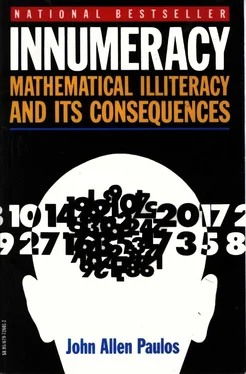Freudian theory suffers from a more serious problem as well. Consider the statement: "Whatever God wills, happens." People may be able to take solace from it, but it's clear that the statement is not falsifiable and hence, as the English philosopher Karl Popper has insisted, not part of science. "Plane crashes always come in threes." You always hear that, too, and if you wait long enough, of course, everything comes in threes.
Popper has criticized Freudianism for claims and predictions which, though perhaps comforting or suggestive in one way or another, are, like the above statements, largely unfalsifiable. For example, an orthodox psychoanalyst might predict a certain kind of neurotic behavior. When the patient doesn't react in the predicted way, but in a very different manner, the analyst may attribute the opposite behavior to "reaction-formation." Likewise, when a Marxist predicts that the "ruling class" will act in an exploitive manner and instead something quite contrary takes place, he may attribute the outcome to an attempt by the ruling class to co-opt the "working class." There always seem to be escape clauses which can account for anything.
This is certainly not the place to argue whether or not Freudianism and Marxism should be deemed pseudosciences, but a tendency to confuse factual statements with empty logical formulations leads to sloppy thought. For example, the statements "UFOs contain extraterrestrial visitors" and "UFOs are unidentified flying objects" are two entirely different assertions. I once gave a lecture in which a listener thought that I subscribed to a belief in extraterrestrial visitors, when all I had said was that there undoubtedly were many cases of UFOs. A similar confusion is satirized by Moliere when he has his pompous doctor announce that his sleeping potion works because of its dormitive virtue. Since mathematics is the quintessential way to make impressive-sounding claims which are devoid of factual content ("Scientists reveal that 36 inches equal 1 yard on the planet Pluto"), it's perhaps not surprising that it is an ingredient in a number of pseudo-sciences. Abstruse calculations, geometric forms and algebraic terms, unusual correlations-all have been used to adorn the silliest drivel.
Interest in parapsychology is very old, yet the simple fact is that there have been no repeatable studies which have demonstrated its existence, Uri Geller and other charlatans notwithstanding. ESP (extrasensory perception) in particular has never been shown in any controlled experiment, and the few "successful" demonstrations have occurred in studies that were fatally flawed. Rather than rehash them, I'd like to make some general observations.
The first one, which is embarrassingly obvious, is that ESP runs afoul of the fundamental common-sense principle that the normal senses must somehow be involved for communication to take place. When confidential information leaks out of an organization, people suspect a spy, not a psychic. Hence, it is the presumption of common sense and science that these ESP phenomena don't exist, and the burden of proof is on those who maintain that there are such phenomena.
This raises probabilistic considerations. Because of the way ESP is defined-communication without any normal sensory mechanisms-there is no way to tell the difference between a single incidence of ESP and a chance guess. They look exactly the same, just as a particular correct answer on a true-false test looks the same whether the test taker is a straight-A student or someone who's guessing at every question. Since we can't ask the ESP subjects to justify their responses, as we can the true-false test takers, and since by definition there's no sensory mechanism into whose functioning we can inquire, the only way we can demonstrate the existence of ESP is by statistical test: run enough trials and see if the number of correct responses is sufficiently large so as to rule out chance as the explanation. If chance is ruled out and there are no other explanations, ESP will be demonstrated.
There is, of course, a tremendous will to believe which accounts for many of the faulty experiments (such as J. B. Rhine's) and much of the outright chicanery (such as S. G. Soal's) that seem to characterize the paranormal field. Another factor is what is sometimes referred to as the Jeane Dixon effect (after the self-described psychic Jeane Dixon), whereby the relatively few correct predictions are heralded and therefore widely remembered, while the much more numerous incorrect predictions are conveniently forgotten or deemphasized. Supermarket tabloids never provide an end-of-year list of false predictions by psychics, nor do the more upscale New Age periodicals, which, despite a veneer of sophistication, are just as fatuous.
People often take the abundance and prominence of reports on psychics and parapsychological matters to be a kind of evidence of their validity. Where there's so much smoke (hot air, actually), people reason, there must be fire. The nineteenth century's infatuation with phrenology-to continue with a somewhat different heady concern-demonstrates the flimsiness of this line of thought. Then as now, pseudoscientific beliefs were not limited to the uneducated, and the belief that various psychological and mental attributes were discernible by examining the bumps and contours of one's head was widespread. Many corporations required prospective employees to submit to phrenological examinations as a condition of employment, and many couples contemplating marriage sought the advice of phrenologists. Periodicals devoted to the subject appeared, and references to its doctrines pervaded popular literature. Renowned educator Horace Mann saw phrenology as "the guide to philosophy and the handmaiden of Christianity," and Horace Greeley of "Go West, young man" fame advocated phrenology tests for all railroad engineers.
Descending to more pedestrian matters, let's consider the firewalker's practice of walking barefoot on hot wood coals. The practice has often been cited as an example of "mind over matter" and you don't have to be innumerate to be impressed initially with such a feat (or with such feet). What makes this phenomenon less remarkable is the relatively little known fact that dehydrated wood has an extremely low heat content and very poor heat conductivity. Just as it's possible to put your hand into a hot oven without burning yourself as long as you don't touch the metal oven racks, a person can walk quickly across burning wood coals without any serious harm to his feet. Of course, quasi-religious talk about mind control is more appealing than a discussion of heat content and conductivity. This, combined with the fact that these walkings take place in the evening to heighten the contrast between the cool night air and surrounding darkness and the hot glowing coals, accounts for the dramatic impact of firewalking.
Many other examples of pseudoscience (auras, crystal power, pyramids, the Bermuda triangle, etc.) are unmasked in The Skeptical Inquirer, a delightful quarterly publication of CSICOP, the Committee for the Scientific Investigation of Claims of the Paranormal, published by philosopher Paul Kurtz in Buffalo, New York.
Another presumed kind of extrasensory perception is the predictive dream. Everyone has an Aunt Matilda who had a vivid dream of a fiery car crash the night before Uncle Mortimer wrapped his Ford around a utility pole. I'm my own Aunt Matilda: when I was a kid I once dreamed of hitting a grand-slam home run and two days later I hit a bases-loaded triple. (Even believers in precognitive experiences don't expect an exact correspondence.) When one has such a dream and the predicted event happens, it's hard not to believe in precognition. But, as the following derivation shows, such experiences are more rationally accounted for by coincidence.
Читать дальше












